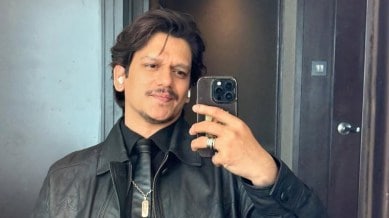📣 For more lifestyle news, click here to join our WhatsApp Channel and also follow us on Instagram
‘I would cry for hours’: Vijay Varma on confronting years of buried childhood pain, being helped by Ira Khan; how unresolved trauma shapes adult love
Eventually, he began therapy and was diagnosed with “severe depression and anxiety.”

Actor Vijay Varma recently opened up about navigating a painful journey, revealing how unresolved childhood trauma and family conflict took a heavy toll on his mental health.
During a candid conversation with Rhea Chakraborty on her podcast Chapter 2, Vijay shared that a turbulent relationship with his father and years of struggle in the film industry had left lasting emotional scars. “My love for my father took a beating when I became a teenager. He loved me, but he wanted so many things from me that I didn’t want — my career, my friends, even how I spent my time. Everything about me seemed to bother him,” he said. The disapproval and distance eventually pushed him to leave home, a decision he admits he still feels guilty about. “I carried guilt about leaving home. I still do. I left my family and struggled alone for a decade with no achievement. Today things make sense — but back then, they didn’t.”
Years later, during the pandemic, that buried pain resurfaced as a mental health crisis. “I kept deteriorating. Ira (Khan) was the first to say, ‘Vijay, you need to start moving.’ She made me join Zoom workouts. She was like my coach,” he revealed. Eventually, he began therapy and was diagnosed with “severe depression and anxiety.” He recalled, “During Surya Namaskar, I would collapse and cry for hours without knowing why.”
Reflecting on his recovery, Vijay shared, “Coming from a dysfunctional family, if you don’t sort things out, it leaves a lasting mark. You think you’ve forgotten childhood hurt, but the subconscious remembers.” He also touched on how early trauma can influence adult love patterns: “It shows up in your love life. You keep repeating patterns unless you talk about them… When you have seen close relationships fail you as a child, love starts to feel like fear. So you push people away.”
But how does unresolved childhood trauma continue to affect our emotional health in adulthood?
Gurleen Baruah, existential psychotherapist at That Culture Thing, tells indianexpress.com, “Childhood hurt rarely disappears; it changes form. What wasn’t felt or named earlier often returns as adult patterns, such as sudden anger or tears, numbness, people-pleasing, perfectionism, control, or ‘checking out’ in close relationships. The mind may say ‘I have moved on,’ but the body and nervous system stay on guard, scanning for old danger; small triggers feel big because they touch unfinished feelings. We also carry forward early ‘maps’ of love and safety, so we may repeat familiar dynamics such as pursuing distance, clinging, or choosing partners who recreate the past, without meaning to.”
Repair begins by noticing the pattern, naming it, and allowing the feelings to be felt safely (often with therapy), so the past can be integrated rather than endlessly re-enacted.
Why does physical movement or therapy sometimes trigger unexpected emotional releases?
When we go through painful experiences, especially early in life, Baruah states that the body carries what the mind cannot process. Trauma is stored not just as memory, but also as sensations, such as tightness in the chest, a knot in the stomach, or a constant alertness in the muscles.
She adds, “So, when someone moves through yoga, breathwork, or therapy, these frozen parts start to thaw. Movement brings awareness back into areas that have been shut down for years. That’s why people sometimes cry or tremble without knowing why. The body is releasing what words never could. It’s not weakness, it’s integration.”
Breaking emotional patterns and forming healthier, more secure relationships
“Healing starts with awareness: noticing these patterns without judgement. Gradually, through therapy or relationships that feel steady and patient, one learns to stay when the instinct is to run. That’s how new emotional wiring is built — slowly, with trust, and with gentleness toward the parts of you that once needed to protect themselves,” concludes the expert.
📣 For more lifestyle news, click here to join our WhatsApp Channel and also follow us on Instagram